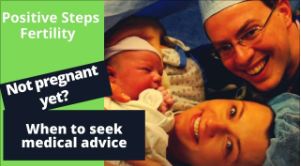One of the most common questions about reproductive health, especially when someone is struggling with infertility, is “Am I doing something wrong?”
The complex nature of fertility makes answering that question extremely difficult. Plenty of factors that contribute to infertility are genetic. Others are caused by preexisting conditions. To summarily say that one lifestyle choice is the sole reason contributing to your inability to conceive is both unhelpful and most likely inaccurate.
That said, several lifestyle factors, taken in context with your overall reproductive health, can positively or negatively impact your fertility. We can’t stress enough that each person is unique and has a unique fertility journey. To understand where you are on your journey, step one is to consult a fertility specialist who can give you an exhaustive view of your fertility.
This post aims to raise awareness of choices you could be making that could impact your fertility. Use this as a guide to help you ask questions of a specialist who can give you an in-depth assessment of the various factors of your health. Alright, let’s look at lifestyle factors that can affect fertility.
1. How Your Age Affects Your Fertility
At first, age might not feel like a lifestyle factor; after all, we cannot control how old we are. But when we talk about age and the biological clock, at what age you choose to have your child can affect your ability to conceive.
Egg Quality and Quantity
As women age, the quality and quantity of their eggs decline. The ovaries release fewer eggs, and those that remain may have genetic abnormalities. This makes conception more challenging.
A common misconception is that women lose one egg per month. In reality, about 900 eggs are lost each month, roughly 30 eggs daily. Even with high-end fertility medications, fertility specialists can retrieve only a certain number of these eggs.
- At age 30, you can typically retrieve around 25 eggs.
- By 35, this number drops to an average of 16 eggs.
- At 40, you might be able to retrieve around 8 eggs.
Quality is equally crucial. A 30-year-old woman generally has around 75% of her eggs chromosomally normal. By 35, this drops to approximately 50%; at age 40, it’s about 25%
Men’s Sperm Quality
Men are not immune to age-related changes either. Sperm quality and quantity decreases with age, affecting fertility. It’s a reminder that both partners play a crucial role in the journey toward parenthood.
This is just one example of several of male factor infertility, which can often be overlooked.
Generally speaking, starting a family earlier in life can positively impact fertility. Waiting until later in life may reduce the chances of successful conception. If you’re planning to have children, consider the optimal timing based on your individual circumstances.
2. Nutrition and Weight: Fueling Fertility
Weight and diet have become a central issue to many in the national fertility conversation. According to statistics from the Harvard T.H. Chan School of Public Health, two out of three Americans are overweight. One in three are classified as obese.
While weight and nutrition are by no means the main factor in fertility, nor can maintaining them fix underlying issues, there are clear signs that being overweight and having poor nutrition can potentially hinder fertility. We also must note that while some weight and nutrition issues are caused by lifestyle factors, some of these are due to genetic or other medical conditions, and should be approached appropriately.
The Role of Nutrition
A diet rich in nutrients, vitamins, and antioxidants supports reproductive health. Essential nutrients like iron and zinc contribute to egg and sperm development. While fats are essential, opt for healthy fats (such as those found in avocados, nuts, and olive oil) over saturated fats, and do so in moderation.
Prenatal vitamins, while unable to solve underlying issues, have their benefits. According to the Mayo Clinic, “taking vitamins containing folic acid can help prevent neural tube defects.”
The Role of Weight
Underweight
While most people point to obesity as a hindrance to fertility, being underweight can affect fertility as well. It can disrupt hormonal balance, leading to irregular menstrual cycles and reduced fertility.
Overweight
Excess body fat can affect ovulation, sperm count and quality, and increase the risk of conditions like polycystic ovary syndrome (PCOS).
Maintaining a healthy weight promotes reproductive health, and can reduce complications for treatments like IVF or even complications during pregnancy.
Regardless of your current body weight, do not be discouraged. Reaching out to a specialist can give you a clear picture of your options and how to move forward in your fertility journey.
3. How Too Little or Too Much Exercise Impacts Fertility
Exercising in Moderation
Regular exercise promotes overall health, but excessive exercise can disrupt hormonal balance. Intense workouts may affect ovulation in women. The Mayo Clinic suggests that women seeking to conceive limit their exercise to “less than five hours a week and less than 60 minutes a day.”
Ovulation, or the process in which an egg is released from a woman’s ovary, is crucial to fertility. If excessive exercise throws this cycle off balance, it could decrease your likelihood of conceiving.
Sedentary Lifestyle and Fertility
On the flip side, a sedentary lifestyle can also impact fertility. For one, a sedentary lifestyle without exercise can lead to obesity, which as we have noted, can have its own implications on fertility.
Maintaining a healthy routine of exercise can promote overall health which in turn can be beneficial to reproductive health. The American College of Obstetricians and Gynecologists (ACOG) states that “evidence suggests that aerobic and strength conditioning exercises should be encouraged before, during, and after pregnancy.”
Finding the right balance of exercise and rest can be difficult. Consult a specialist to help determine how exercise could play a role in your reproductive health.
4. How Stress Affects Fertility
While stress is certainly an important issue to address, in terms of fertility, it’s less of a factor than most people believe. This is not to say that stress cannot or does not play a role, only that stress alone does not amount to infertility.
Those dealing with a long history of depression and anxiety, for example, could have more trouble conceiving naturally and with IVF, according to the Mayo Clinic.
However, the issue has not been fully studied. And while being stressed cannot fix your ovaries, being stress-free certainly can’t hurt when it comes to pregnancy. But let’s not go overboard; stress is one small piece of what is a much larger puzzle of your fertility. The good news is that there is often a solution to that puzzle. But singling out stress as the sole factor is often not the answer. Once again, a fertility specialist can help give you an exhaustive view of your fertility.
5. Substance Use and Abuse and Its Impact on Fertility
Certain things you put in your body can have a detrimental effect on your reproductive health. It’s important to understand what these substances are and how they can reduce your ability to conceive.
Smoking
Cigarette smoking reduces fertility in both men and women according to the FDA. It damages eggs, sperm, the lining of the uterus, and essential hormone production.
If you smoke on a consistent basis and are trying to conceive, your specialist might recommend quitting if they feel it is reducing your chances of pregnancy.
For example, one study claims that men who smoke have 13% to 17% lower sperm density, which reduces the amount of sperm that are traveling toward the egg to fertilize.
Alcohol
Excessive alcohol and caffeine consumption may negatively influence fertility. Harvard Health cites a study in which women who drank more than seven drinks weekly saw a 7% reduction in conception chance as opposed to women who did not drink at all. For men, that number was 9%.
Illicit Drugs
This might seem obvious to some, but drug use can severely impair reproductive function. Recovery First Treatment Center says that “the use of drugs like marijuana, cocaine, LSD, ecstasy, and methamphetamines can severely disrupt normal menstrual cycles.” For men, “Many street drugs as well as prescription drugs have been shown to lower both the sperm count and total seminal fluid in drug users, as well as lower levels of testosterone.”
Irregular menstrual cycles cause problems for your fertility. It throws off the timing, and affects hormones, among many other issues that can tangle up your fertility journey. As for sperm count, less sperm essentially means less opportunity for a sperm to meet an egg.
For these reasons and so many more, recreational drugs should be avoided when trying to achieve pregnancy.
Final Thoughts: Making Informed Lifestyle Factors and Choices Can Help to Optimize Fertility
Making informed lifestyle choices is crucial for maintaining reproductive health. Your choices can have an impact. But, we must acknowledge that even if you are making all the right lifestyle choices, it does not mean you will conceive. There are so many factors at play when it comes to your reproductive health, which can be daunting to many people. If you are feeling overwhelmed by any aspects of fertility, we are here to help guide you and provide the clarity you need on your fertility journey. Don’t suffer in silence. Find answers. Find peace. Reach out today.




